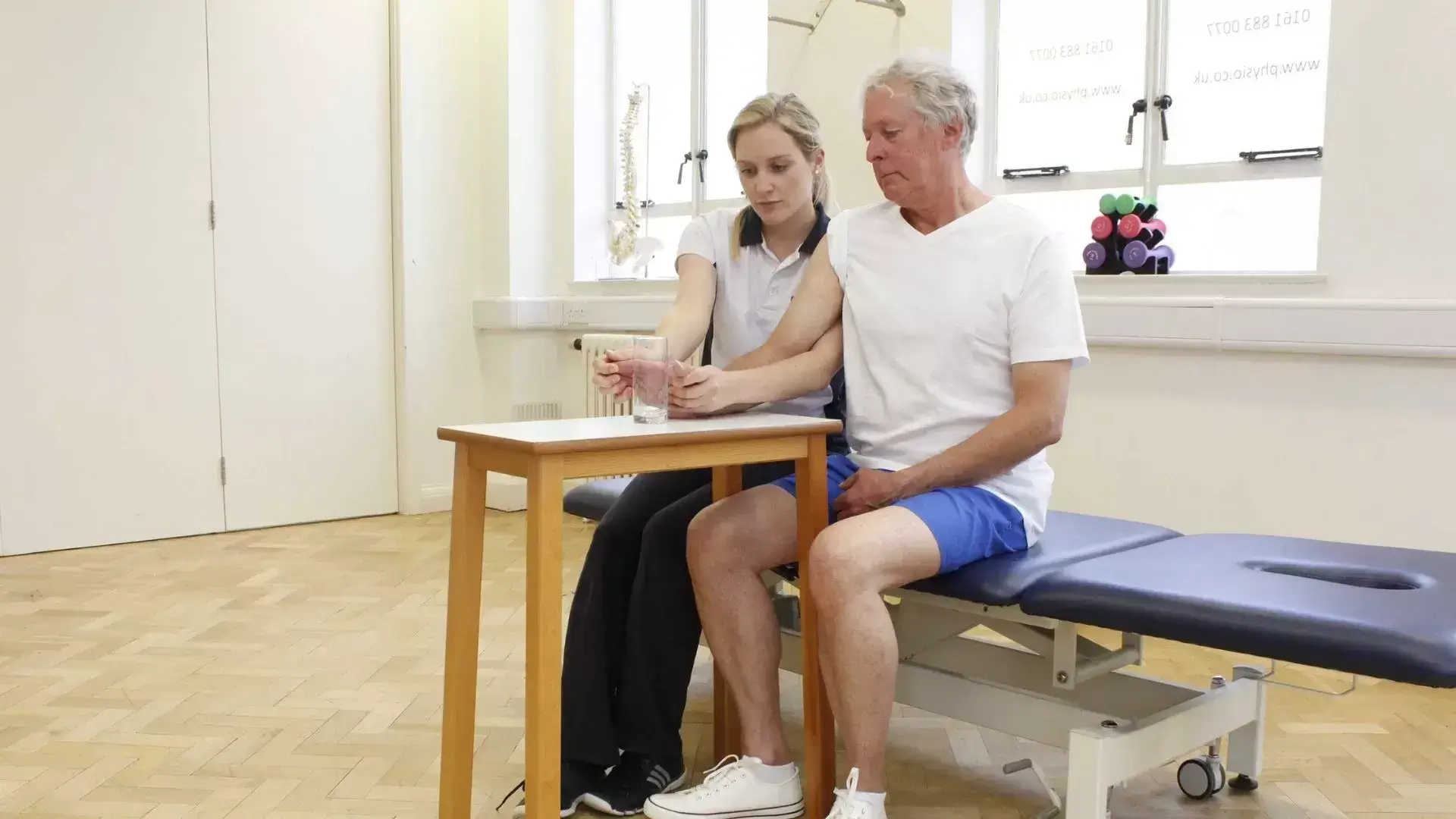At our Mississauga clinic, we specialize in physiotherapy for spinal misalignment, focusing on restoring balance and functionality. We recognize that factors like poor posture, injuries, and muscle imbalances can lead to discomfort and limited mobility. Our approach combines targeted treatments, core strengthening exercises, and personalized rehabilitation plans, ensuring we address your specific needs. We conduct thorough assessments to create tailored solutions that promote long-term spinal health. By emphasizing patient education and proactive care, we empower you to maintain ideal alignment. Discover insights on further enhancing your spinal health as we guide you through your rehabilitation journey.

At Mississauga Physio Chiro Clinic, we specialize in providing thorough physiotherapy and chiropractic services tailored to address spinal misalignment and enhance overall well-being. Our approach integrates chiropractic adjustments and spinal alignment therapy to correct misalignments effectively. We recognize the importance of proper spinal health, which is why our treatments focus on restoring balance and functionality to the spine.
We offer extensive spinal dysfunction treatment that includes postural correction techniques, ensuring that our patients achieve optimal spinal support. Our dedicated team works closely with each individual, evaluating their unique needs and developing personalized rehabilitation plans. This patient-centered approach not only promotes back pain relief but also encourages long-term spinal health.
In addition to chiropractic adjustments, we emphasize the importance of physiotherapy in our services. Our Expert Physiotherapists & Chiropractor in Mississauga employ targeted exercises and therapies to facilitate spinal rehabilitation, helping patients regain strength and mobility. By combining these modalities, we aim to empower our patients on their journey toward recovery and wellness. Together, we can work towards achieving a healthier spine and a more active lifestyle, enhancing your overall quality of life.
Spinal misalignment can occur due to various causes and contributing factors, including poor posture, injuries, and repetitive strain on the spine. We often notice that postural misalignment, such as slouching or hunching over electronic devices, can lead to significant spinal dysfunction. Over time, these habits can result in vertebral misalignment, which can cause spinal deviation and contribute to chronic back pain.
Injuries, whether from sports or accidents, can also lead to spinal misalignment. These incidents may create imbalances in our spinal structure, leading to nerve impingement or spinal inflammation that further exacerbates discomfort. Furthermore, repetitive activities, like lifting heavy objects improperly or sitting for prolonged periods, can strain the spine and compromise spinal mobility.
Recognizing the common symptoms of spinal misalignment is essential for understanding how these issues can influence our overall well-being and daily activities. Many of us experience spinal misalignment symptoms, which can manifest as neck pain, upper back pain, and lower back pain. These discomforts often arise from spinal joint dysfunction, leading to spinal instability and potential nerve compression.
When our spine is misaligned, it can result in increased spinal muscle tension, which further exacerbates pain and limits mobility. This tension can affect our posture, making posture correction more challenging. As we go about our daily routines, we may notice that simple tasks become increasingly difficult, and our overall spinal wellness suffers.
It’s important for us to pay attention to these signs, as they can greatly impact not just our physical health but also our mental well-being. By recognizing these symptoms early, we can take proactive steps towards addressing spinal misalignment, reducing pain, and improving our quality of life. Ultimately, understanding these issues empowers us to seek appropriate treatment and maintain a healthy, active lifestyle.
Physiotherapy plays an essential role in restoring spinal alignment by employing targeted techniques that address the underlying issues contributing to misalignment. We focus on spinal manipulation and spinal realignment to correct abnormal spinal curvature, ensuring that our patients regain peak spinal flexibility.
Poor spinal posture is often a significant factor in spinal misalignment, and we emphasize education on ergonomics and body mechanics to help prevent future issues. Alongside chiropractic therapy, we create individualized treatment plans that incorporate various modalities for spinal stabilization.
Core strengthening exercises are key components of our approach, as they support the spine and enhance overall stability. By working together, we empower our patients to take an active role in their recovery, enabling them to understand the importance of maintaining proper spinal alignment.
Our goal is to facilitate spine correction through a combination of manual therapy, exercise, and patient education, fostering long-term health and well-being. Ultimately, we believe that with the right support and resources, anyone can achieve a healthier spine and improved quality of life.

Evaluating spinal misalignment involves a thorough clinical evaluation and advanced imaging techniques to accurately identify the underlying causes of discomfort and dysfunction. We start with clinical evaluations, evaluating spinal biomechanics through detailed physical examinations. By examining posture, range of motion, and muscle strength, we can detect issues like spinal subluxation or spinal compression that may lead to nerve irritation.
Advanced imaging, such as X-rays or MRIs, offers us a clearer view of spine alignment and helps us understand the severity of the misalignment. These images allow us to pinpoint specific areas of concern and create a tailored treatment plan. We believe this combination of clinical evaluations and imaging is vital in evaluating spinal misalignment effectively.
Once we identify the issues at hand, we can implement appropriate spinal therapy and chiropractic spine care. Our goal is to relieve pain, restore proper alignment, and enhance overall function. By taking a thorough approach to evaluating spinal misalignment, we guarantee that our patients receive the most effective care possible, helping them achieve lasting relief and improved well-being.
To improve spinal alignment and balance, we often incorporate postural therapy techniques that focus on correcting alignment issues and enhancing overall body awareness. This approach is essential for addressing common problems like spine imbalance, forward head posture, and rounded shoulders. By teaching patients about ergonomic posture, we help them understand how to maintain proper alignment during daily activities.
In our sessions, we emphasize the importance of spinal flexibility exercises and core stability to combat muscle imbalances that contribute to poor posture. These exercises not only improve spinal alignment but also enhance overall body strength, reducing the risk of injury. We also utilize spinal mobilization techniques to promote greater movement and flexibility in the spine, allowing for better posture.
Hands-on physiotherapy techniques play an essential role in realigning the spine and addressing specific misalignment issues to enhance overall function and comfort. We focus on identifying vertebral subluxations that contribute to spinal distortion, including cervical, thoracic, and lumbar misalignments. By employing targeted manual therapies, we can effectively alleviate discomfort and improve spinal nerve health.
For patients experiencing conditions like herniated discs or pinched nerves, we utilize spinal decompression techniques to relieve pressure on affected areas. This approach is particularly beneficial for those suffering from mid-back pain, as it helps restore proper alignment and function. Our skilled physiotherapists employ gentle mobilization and manipulation techniques tailored to each individual’s needs, ensuring a personalized treatment plan.
In addressing spinal misalignments, we emphasize the importance of patient education, empowering you to understand how these hands-on techniques contribute to your overall well-being. By working collaboratively, we endeavor to alleviate pain and improve mobility, leading to a more comfortable, active lifestyle. Together, we can optimize your spinal health and enhance your quality of life through effective hands-on physiotherapy interventions.
Core strengthening and stability exercises are essential components of our approach to providing the necessary support for spinal health and alignment. By focusing on these exercises, we can help alleviate issues related to conditions such as scoliosis, kyphosis, and lordosis. A strong core stabilizes the spine, reducing spinal cord pressure and minimizing the risk of exacerbating degenerative disc disease.
Incorporating specific stability exercises into our routines not only enhances spinal support but also improves posture and balance. For instance, we can utilize exercises that promote pelvic tilt, which can be particularly beneficial for individuals with functional scoliosis. These movements engage the abdominal and back muscles, fostering a robust support system for the spine.
Moreover, by targeting core strength, we’re equipping ourselves with the tools to maintain proper alignment during daily activities, thereby reducing the likelihood of injury. Our tailored exercise programs empower us to take charge of our spinal health, ensuring that we’re building a resilient foundation for the spine. Together, we can make significant strides toward improved spinal function and overall well-being through committed practice of core strengthening and stability exercises.

Addressing muscle imbalances plays a pivotal role in enhancing spinal function and can greatly complement the core strengthening exercises we’ve discussed. In physiotherapy, we often find that individuals with spinal misalignment experience conditions like bulging discs, sciatica, or facet joint dysfunction due to uneven muscle strength and flexibility. By identifying these muscle imbalances, we can tailor our approach to support proper spinal alignment.
For instance, individuals with tech neck may exhibit tightness in the upper trapezius while the deep neck flexors remain weak. Similarly, those with structural scoliosis or spinal kyphosis may have one side of their body more developed than the other, necessitating targeted interventions. Through a combination of stretching and strengthening exercises, we can help restore balance to the musculature surrounding the spine.
Ultimately, our goal is to improve spinal function by correcting these imbalances, promoting better posture, and reducing pain. As we progress, we’ll continue to integrate these techniques into our physiotherapy sessions, ensuring a thorough approach to spinal health. Together, we can work towards a more aligned and functional spine, reducing the risk of future complications.
Physiotherapy offers effective solutions for managing conditions like scoliosis, kyphosis, and lordosis, focusing on individualized treatment plans that promote spinal alignment and overall well-being. At our clinic located at 1834 Lakeshore Rd W #6C, Mississauga, ON L5J 1J7, we recognize how these conditions can lead to discomfort and affect your daily life.
Our experienced physiotherapists assess each patient thoroughly, considering factors such as sacral misalignment and potential complications like spinal stenosis. By tailoring exercises and interventions to your specific needs, we aim to strengthen the muscles supporting your spine, enhance flexibility, and improve posture.
We incorporate a combination of manual therapy, guided exercises, and education about ergonomic practices. This holistic approach not only addresses the curvature of the spine but also empowers you to manage your condition effectively.
If you or someone you know is experiencing symptoms associated with scoliosis, kyphosis, or lordosis, don’t hesitate to contact us. Together, we can develop a personalized physiotherapy plan that promotes healing, improves function, and enhances quality of life. Your journey towards better spinal health starts with a single step!
Spinal decompression therapy effectively alleviates nerve pain and relieves pressure on the spine, helping us restore comfort and function for our patients. This non-invasive treatment targets conditions such as herniated discs, degenerative disc disease, and sciatica, where nerve compression can lead to significant discomfort.
During spinal decompression therapy, we gently stretch the spine, creating negative pressure within the discs. This process promotes the retraction of herniated disc material, allowing the disc to heal and reducing inflammation. Our patients often experience immediate relief from pain, which can greatly enhance their daily activities and overall quality of life.
We customize each treatment session to fit our patients’ specific needs, ensuring the therapy is both safe and effective. Regular sessions can lead to long-term benefits, helping to maintain spinal health and prevent future issues.
As we work collaboratively with our patients, we also emphasize the importance of complementary physiotherapy techniques to support their recovery. Together, we can develop a thorough approach that fosters healing and empowers our patients to take control of their spine health. Spinal decompression therapy is an essential tool in our physiotherapy arsenal, promoting lasting relief and improved functionality.
Tech neck and forward head posture have become prevalent issues in our digital age, but with targeted physiotherapy strategies, we can effectively manage and alleviate these conditions. Many of us spend hours hunched over screens, leading to discomfort and misalignment. Through physiotherapy, we can address these challenges by focusing on specific exercises and education.
First, we’ll assess our posture and identify any muscular imbalances. Strengthening weak muscles, particularly in the upper back and neck, is essential. We’ll engage in exercises like chin tucks and shoulder blade squeezes to promote proper alignment and support spinal health.
Additionally, we’ll incorporate stretches to relieve tension in tight muscles, such as the chest and neck. We’ll also discuss ergonomic adjustments for our workspaces, helping us maintain a healthier posture throughout the day.
By integrating chiropractic care with physiotherapy, we can enhance our approach to achieving ideal spinal health and address various misalignment issues more effectively. Both disciplines focus on restoring function and alleviating pain, but they offer unique perspectives and techniques that complement each other.
Chiropractic care primarily emphasizes spinal manipulation and alignment. By addressing vertebral subluxations, chiropractors help restore proper movement and reduce nerve interference. This foundational adjustment can lead to improved overall health and less discomfort.
On the other hand, physiotherapy employs exercises, manual therapy, and modalities like ultrasound or electrical stimulation to strengthen muscles, improve flexibility, and promote healing. By focusing on rehabilitation, physiotherapists help us regain strength and mobility, ensuring we maintain the benefits gained from chiropractic adjustments.
When we combine these two approaches, we create an extensive treatment plan tailored to our specific needs. This synergy not only addresses immediate symptoms but also fosters long-term spinal health and wellness. By working collaboratively, chiropractors and physiotherapists can empower us to take charge of our spinal health, leading to improved quality of life and enhanced physical performance.
Making ergonomic adjustments and embracing lifestyle changes are essential steps we can take to support a healthier spine and prevent discomfort in our daily lives. We spend significant time at desks, so ensuring our workstations are ergonomically designed is imperative. This includes adjusting chair height, using lumbar support, and positioning our monitors at eye level.
In addition to workplace adjustments, we should pay attention to our posture throughout the day. Regularly reminding ourselves to sit and stand tall can alleviate strain on our spines. Implementing short breaks to stretch and move can also make a significant difference in our spinal health.
Moreover, incorporating physical activity into our routines is crucial. Activities like walking, swimming, or yoga help strengthen our core and improve flexibility, which supports spinal alignment.
Lastly, we should be mindful of our sleeping habits. Choosing a supportive mattress and pillow can impact our spinal alignment during rest. By making these ergonomic adjustments and lifestyle changes, we can enhance our overall well-being and promote a healthier spine, reducing the risk of future issues. Let’s commit to these practices together for a better quality of life.
To guarantee our spines stay aligned and healthy over the long term, we must adopt consistent strategies that integrate proper posture, regular exercise, and mindful movement into our daily routines. First, let’s focus on maintaining proper posture while sitting, standing, and lifting. By being aware of our body mechanics, we can minimize strain on our spines.
Incorporating regular exercise is essential. We should aim for a balanced routine that includes strength training, flexibility exercises, and cardiovascular activities. Strengthening our core muscles supports our spine and improves overall stability.
Mindful movement techniques, such as yoga or Pilates, can enhance our awareness of body alignment and promote flexibility. These practices also help us develop better control over our movements, reducing the risk of injury.
Additionally, we can benefit from routine self-assessments to identify any changes in our posture or discomfort. Listening to our bodies and addressing any issues early can prevent more significant problems down the line. By committing to these long-term strategies, we can create a solid foundation for spinal health, ensuring that we remain active and pain-free in our daily lives.
Scheduling a physiotherapy session for spinal misalignment treatment in Mississauga can greatly enhance our journey toward ideal spinal health and overall well-being. By seeking professional guidance, we’re taking an important step in addressing the root causes of our discomfort and misalignment. A qualified physiotherapist will conduct a thorough assessment, allowing us to understand our specific issues and develop a tailored treatment plan.
During our initial session, we can expect a detailed evaluation of our posture, flexibility, and strength. From there, our physiotherapist will guide us through targeted exercises designed to correct our misalignment and strengthen supporting muscles. These personalized sessions not only focus on immediate relief but also aim to provide us with long-term strategies for maintaining spinal health.
It’s essential to remember that consistency is key. Regular sessions can help us monitor our progress and make necessary adjustments to our treatment plan. So, let’s take action today! By booking our physiotherapy appointment, we’re investing in our health and taking proactive steps toward a pain-free, aligned spine. Together, we can set off on this journey to ideal spinal health and improved quality of life.
Located in the heart of the Greater Toronto Area, Mississauga is a vibrant city known for its diverse community, rich cultural offerings, and commitment to promoting health and wellness among its residents. As we explore the city, we can appreciate the blend of modern urban living and natural beauty, with numerous parks and recreational facilities that encourage an active lifestyle.
Mississauga is home to a variety of healthcare services, including state-of-the-art physiotherapy clinics that cater to residents dealing with spinal misalignment and other musculoskeletal issues. The city’s healthcare professionals are dedicated to providing personalized treatment plans, ensuring that each patient receives the best possible care.
In addition to healthcare, Mississauga boasts an array of cultural attractions, from art galleries to multicultural festivals, fostering a sense of community and belonging. This environment enhances our overall well-being, making it easier for us to stay engaged and active in our health journeys.

When we think about a typical physiotherapy session, it usually lasts between 30 to 60 minutes. During this time, our therapist evaluates our condition, provides treatment, and offers guidance on exercises. The duration can vary based on individual needs and treatment goals. It’s important to communicate with our therapist about any concerns, ensuring we get the most out of each session while focusing on our recovery and overall well-being.
When it comes to insurance coverage for physiotherapy, we should always check our specific policy details. Many insurance plans do cover physiotherapy treatments, but it varies widely. It’s important for us to contact our insurance provider directly to confirm what’s included and whether we need any referrals or pre-approvals. Understanding our coverage can help us make informed decisions about our treatment options and financial responsibilities moving forward.
Our physiotherapists hold advanced degrees in physiotherapy and are trained in various techniques specifically for treating spinal issues. They’ve completed extensive continuing education and are often certified in specialized areas, ensuring they stay current with the latest treatment approaches. We’re committed to delivering personalized care, combining our expertise with a patient-centered focus to address each individual’s unique needs. Your well-being is our top priority, and we endeavor for the best outcomes in your treatment.
Yes, we can usually continue our regular activities while undergoing physiotherapy. However, it’s important to listen to our bodies and communicate with our physiotherapist about any discomfort. They’ll guide us on which activities are safe and beneficial during treatment. Typically, we’re encouraged to maintain light activities, as they can aid in recovery. Our physiotherapist will provide personalized recommendations to guarantee we stay active without compromising our healing process.
When considering the benefits of physiotherapy for spinal misalignment, we find that people of all age groups can gain considerably. From children developing posture to adults managing chronic pain, and even seniors seeking mobility improvements, each group has unique needs that physiotherapy addresses. It’s important for us to recognize that early intervention can lead to better long-term outcomes, making physiotherapy a valuable resource for anyone experiencing spinal misalignment, regardless of age.
Reach out to us today to book an appointment or learn more about our services. Our friendly team is here to answer your questions and help you take the first step toward improved health and wellness.
(647) 372-1209

At our Mississauga Physio Chiro Clinic, we are dedicated to providing personalized care that addresses the root cause of your discomfort. With a team of experienced physiotherapists and chiropractors, we focus on restoring your mobility, relieving pain, and enhancing your overall well-being.